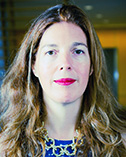
Leslie B. Vosshall
Howard Hughes Medical Institute
|
Primary Section: 24, Cellular and Molecular Neuroscience Secondary Section: 26, Genetics Membership Type:
Member
(elected 2015)
|
Biosketch
Leslie B. Vosshall is a molecular neurobiologist known for her work on the genetic basis of chemosensory behavior in both insects and humans. Her notable contributions to science include the discovery of the insect odorant receptors, and the elucidation of general principles regarding their function, expression, and the connectivity of the sensory neurons that express them to primary processing centers in the brain. She founded the Rockefeller University Smell Study in 2004 with the goal of understanding the mechanisms by which odor stimuli are converted to olfactory percepts. Her group was the first to associate genetic variation in a single gene with differences in odor perception. She was born in 1965 in Lausanne, Switzerland and grew up in Germany and New Jersey. She graduated from Columbia College in the City of New York in 1987, and earned a PhD in molecular genetics from The Rockefeller University in 1993. Her postdoctoral work in molecular neurobiology was carried out at Columbia University Medical School. She joined the faculty of The Rockefeller University in 2000, and was named an investigator of the Howard Hughes Medical Institute in 2008. She is an elected fellow of the American Association for the Advancement of Science, and a member of the National Academy of Sciences.
Research Interests
Vosshall is known for her pioneering work on the genetic basis of chemosensory behavior in insects, particularly disease-vectoring mosquitoes. Her notable contributions to science include the discovery of the insect odorant receptors, and the elucidation of general principles of their function, expression, and the connectivity of the sensory neurons that express them to primary processing centers in the brain. Her research program is aimed at understanding the molecular neurobiology of host-seeking and blood-feeding in mosquitoes that spread dangerous infectious diseases.

